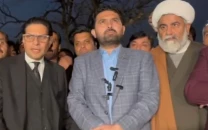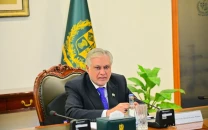Parliament intended well in SC (Practice & Procedure) Act: CJ Isa
Isa says Constitution, laws should not be subjected to wishes of chief

Chief Justice Qazi Faez Isa observed on Monday parliament’s intention in enacting the Supreme Court (Practice and Procedure) Act, 2023, was good, and judged a number of countries where judicial affairs were conducted with mutual consultation.
Heading the full court for hearing of the Practice and Procedure Act, the chief justice emphasised that the apex court should never give an impression that the Constitution and the laws were subject to the wishes of the chief justice. “Such an impression will be devastating,” he warned.
The full court conducted the third hearing of the petitions challenging the Practice and Procedure Act. The bench, led by Chief Justice Isa, included all the judges of the apex court.
They are: Justice Sardar Tariq Masood, Justice Ijazul Ahsan, Justice Mansoor Ali Shah, Justice Munib Akhtar, Justice Yahya Afridi, Justice Aminuddin Khan, Justice Mazahar Ali Akbar Naqvi, Justice Jamal Mandokhail, Justice Muhammad Ali Mazhar, Justice Ayesha Malik, Justice Athar Minallah, Justice Syed Hasan Azhar Rizvi, Justice Shahid Waheed and Justice Musarrat Hilali.
During the hearing, Dr Adnan Khan, a lawyer from Khyber-Pakhtunkhwa, petitioner Rana Shahid, besides, lawyers for the Pakistan Muslim League-Quaid (PML-Q) and the PML-Nawaz presented their arguments.
On Monday, the 15-member full court headed by Chief Justice of Pakistan Qazi Faez Isa heard the petitions against the legislation to regulate the powers of the chief justice. He added that the chief justice of Pakistan should not go beyond the Constitution and the law.
While presenting arguments in his individual capacity, Dr Adnan Khan said that the office of the chief justice had been rendered redundant through the act. Under the Constitution, the chief justice was in the driving seat in administrative matters.
PML-Q lawyer Zahid Ibrahim, while arguing in favour of the legislation, said that the constitutional powers of this court had not been reduced under the act. He added that the petitioners, who had challenged the legislation, had not said anything as to which fundamental right was affected by the act.
PML-N lawyer Barrister Salahuddin said that several chief justices and judges had shown reservations to the use of the Article 184(3) of the Constitution, adding that the Pakistan Bar Council (PBC) had been demanding for 10 years for regulating the powers of the chief justice.
Rana Shahid Advocate raised the point that if the 15 judges of the apex court decide the case, where would the appeal go? The chief justice replied that the appeal would not go anywhere, rather it would go to Allah.
During the hearing, Justice Muneeb Akhtar remarked that through this legislation, parliament had been made the master of roster. The chief justice remarked that he was the master of the roster, but also the servant to the Constitution and answerable to Allah.
Justice Mansoor Ali Shah remarked that the age of the masters has ended all over the world and “now we must wake up”. He cited examples of many countries, including the United States and Brazil, where the judiciary conducted its affairs with mutual consultation.
Justice Akhtar said that masters come and go, and no one remains a master forever.
Chief Justice Isa remarked that another chief justice would leave the office in October next year – a reference to his own self. He then said: “The question is, how will we respond to those who have been harmed?”
Barrister Salahuddin said that several chief justices and judges had expressed reservations to the use of the Article 184(3) – which relates to the suo motu powers of the apex court. He said it was not written in the Constitution that the chief justice had the authority to appoint a bench and to hear cases.
He pointed out that since the 1960s, powers of the Supreme Court were expanded by reducing the authority of the chief justice as master of roster. He also gave an example of India, where four Supreme Court judges held a press conference against their chief justice in January 2018.
The chief justice said that it was to be seen what the Supreme Court of India decided on the case against the special status of Indian Illegally Occupied Jammu and Kashmir. He said that Practice and Procedure Act appointed two co-pilots with the chief justice.
However, he added that it could not be said that parliament did it maliciously, parliament enacted the legislation in good faith. The PML-N lawyer, agreed, saying that the independence of the judiciary was strengthened by the legislation.
Justice Minallah inquired whether the cases, which had already been reviewed, would also have the right to appeal. Barrister Salahuddin replied that the cases in which the revisions had been dismissed could not benefit from this legislation.
The right to appeal would be granted on only those decisions which had been taken 30 days before the law was enacted. However, he added that the court might limit the right to appeal by framing rules on the basis on this law.
Supreme Court Bar Association (SCBA) President Abid Zuberi said that if the right to appeal was made available since 1973, it would increase the burden of cases on the Supreme Court. However, the chief justice said the burden would fall on the court “why are you panicking”.
Justice Ahsan inquired if the decision of the three-member committee [of the apex court judges] was administrative, then who would hear the appeal? Justice Mandokhel said that the appeal could be made possible by amending the rules.
During the hearing, Barrister Salahuddin completed his arguments, while lawyers of the Jamaat-e-Islami (JI) and the Jamiat Ulema-e-Islam-Fazl (JUI-F) adopted the arguments for the act.
The court would hear the attorney general, the Pakistan Bar Council and the MQM lawyer on Tuesday (today).



















COMMENTS
Comments are moderated and generally will be posted if they are on-topic and not abusive.
For more information, please see our Comments FAQ